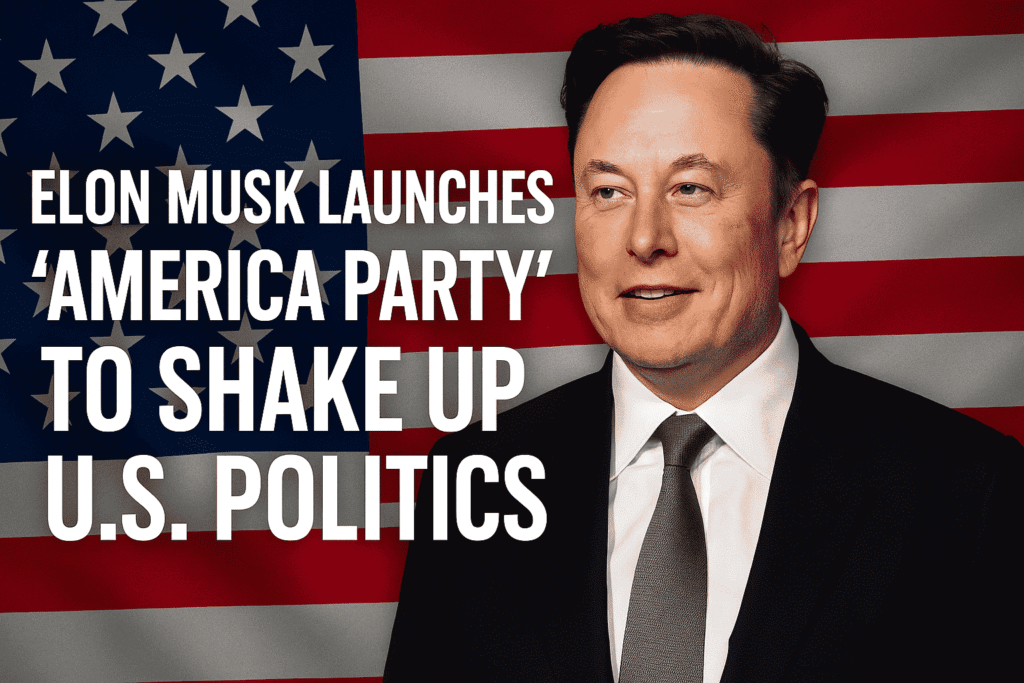Elon Musk, Tesla and SpaceX CEO, announced on July 5, 2025 that he had formed a new political organization called the America Party. Musk said the move followed a July 4 poll on his X (Twitter) platform, in which roughly two-thirds of the 1.2 million respondents voted “yes” to his question about breaking free from the two-party “uniparty” system. The America Party is presented as a fiscally conservative, pro-technology alternative to Washington’s entrenched parties, launched amid Musk’s very public rift with President Donald Trump over a recent massive spending bill. It comes at a crucial moment — just ahead of the 2026 midterm elections — and could reshape tight House and Senate races even if it never fields a presidential candidate.

Background & Timeline
Musk was once a close Trump ally: he spent hundreds of millions on Trump’s 2024 campaign and even led Trump’s “Department of Government Efficiency” (nicknamed DOGE) to cut federal spending. However, relations soured when President Trump pushed through a $5 trillion “One Big Beautiful Bill” of tax cuts and spending. Musk vehemently opposed the legislation, calling it “insane” and warning it would explode the deficit. On July 4 (Independence Day), Trump signed the bill into law, removing some electric-vehicle tax credits Musk favored. That evening, Musk polled his followers on X, asking if they wanted “independence from the two-party (some would say uniparty) system.” Over 1.2 million people answered, with about 65% saying “yes”. The next day, Musk declared on X: “By a factor of 2 to 1, you want a new political party and you shall have it… Today, the America Party is formed to give you back your freedom”.
Is it time to create a new political party in America that actually represents the 80% in the middle?
— Elon Musk (@elonmusk) June 5, 2025
The announcement immediately triggered reactions. For example, Azoria Partners – sponsor of an upcoming Tesla exchange-traded fund – delayed its listing and publicly questioned whether Musk’s political ambitions conflicted with his duties as CEO. Republicans expressed concern that Musk’s feud with Trump could imperil their razor-thin majority in Congress. Musk’s move came hot on the heels of these events: just a week earlier he had announced he would spend money to unseat any incumbent supporting the budget bill. In sum, Musk unveiled the America Party on July 5, 2025, in direct response to the new tax-and-spending law and with support from his massive social-media audience.
| Timeline Event | Date | Details |
|---|---|---|
| Initial Poll | June 5, 2025 | Musk asks if a new party is needed; 80% support. |
| Feud Escalates | June 30, 2025 | Musk threatens to form a party if Trump’s bill passes. |
| Second Poll | July 4, 2025 | 65.4% support creating the America Party. |
| Party Announcement | July 5, 2025 | Musk formally announces the America Party on X. |
Core Ideology & Objectives of America Party
Musk has characterized the America Party as a broadly “centrist” or fiscally conservative alternative to the Democrat-Republican duopoly. Key policy themes, as outlined by Musk and his followers, include:
- Fiscal Conservatism: Slashing waste and deficits. The party stresses reducing the national debt and cutting government spending. Musk argues that Americans are “living in a one-party system” bankrupted by “waste & graft”.
- Strong National Defense (AI-Powered): Modernizing the military with artificial intelligence and robotics. Musk agreed with a proposal to use AI in defense, framing it as part of updating U.S. force capabilities.
- Deregulation & Tech Promotion: Rolling back regulations on businesses and championing the tech sector. Platforms associated with the America Party call for a pro-technology posture and fewer federal constraints on innovation.
- Free Speech Advocacy: Defending broad free-speech rights. Though not detailed in a formal manifesto, Musk’s public statements repeatedly emphasize restoring liberty and open expression, in line with his management of X.
- Pronatalism: Encouraging higher birth rates. Unusually for a U.S. party, Musk’s group openly advocates pro-natalist policies (e.g. family incentives) as a central plank.

Above all, Musk frames the America Party as an anti-“uniparty” movement – an effort to break the entrenched two-party consensus on fiscal and social issues. In his announcement, he proclaimed that the new party is meant to “give you back your freedom” from a system he calls a “one-party system”.
Unlike a presidential campaign, Musk says the America Party will focus on Congress. He envisions targeting a small number of 2026 midterm races rather than running for president. Musk himself wrote on X that he would “laser-focus on just 2 or 3 Senate seats and 8 to 10 House districts,” since winning a handful of pivotal seats with current razor-thin margins “would be enough to serve as the deciding vote on contentious laws”. In other words, the party’s plan is not to run Musk for president, but to place candidates in a few close legislative contests to potentially swing control of Congress.
Public and Political Reactions on America Party
- Donald Trump (and conservatives): Trump derided Musk’s third-party venture. He told reporters it was “ridiculous” to launch a new party and warned that third parties have “never worked” in the U.S. system. On his Truth Social platform, Trump added that Musk was “completely off the rails” and “essentially becoming a TRAIN WRECK” over the past weeks. (Trump’s comments echoed bipartisan skepticism – he argued Musk’s departure stemmed from lost EV tax credits in the bill, and even threatened to cut Musk’s federal subsidies in retaliation.)
- Other Republicans: Even some GOP strategists worry about the fallout. A Reuters report noted that Republican officials fretted Musk’s on-and-off feud with Trump could jeopardize their 2026 majority. To date, Trump’s allies have moved to blunt Musk’s impact. For instance, private equity manager James Fishback (Azoria) announced a super-PAC to oppose any Musk-backed candidates, and even called on the Tesla board to rebuke Musk’s political activities.
- Libertarians and Centrists: The Libertarian Party publicly reached out to Musk. Libertarian National Committee Chair Steven Nekhaila urged Musk to join his party rather than starting a new one, noting the Libertarians already have nationwide ballot access and organization. (No Labels, a centrist group, also said it’s interested in Musk’s platform.) These parties see ideological overlap with Musk’s messages on debt and deregulation, but they argue the practical course is to channel Musk’s support into existing structures.
- Public Opinion: Polls show significant interest but also skepticism. Musk’s own online poll yielded an overwhelming “yes” (roughly 65%) to breaking from the two-party system. Independent surveys reflect similar curiosity. For example, a Quantus Insights poll found ~40% of Americans would consider supporting a Musk-led third party (14% “very likely” and 26% “somewhat likely”). That support skewed toward male and Republican respondents; one data release noted 57% of Republican men were open to the idea. But overall 38% said they probably would not back Musk’s party, and 22% were unsure.
- Investors and Analysts: Some business observers reacted negatively. Azoria’s ETF delay (mentioned above) illustrates investor concern that Musk’s political focus could be a distraction from Tesla. Political analysts note that the credibility of Musk’s agenda hinges on action: so far he has yet to announce any candidates. Experts caution that without sustained organization, a new party may never qualify for ballots nationwide.
Challenges for Third Parties
Launching a third party in U.S. politics is famously difficult, and experts warn Musk will face the familiar hurdles:
- Ballot Access & Laws: Every state has its own rules for new parties. Typically, a nascent party must gather vast petition signatures or register large numbers of members to appear on ballots. Example: in California a party must enroll 0.33% of voters (~75,000 people) or submit 1.1 million signatures just to qualify, and then maintain that base or win 2% of the vote in statewide races to stay qualified. Such requirements can be “daunting,” as U.S. election lawyer Brett Kappel told CBS Newscbsnews.com.
- Two-Party Bias: The U.S. winner-take-all, single-member-district system strongly favors Democrats and Republicans. There is no proportional representation to reward smaller parties. As Georgetown historian Hans Noel notes, most democracies allow small parties to win legislative seats even with minority support, but U.S. rules require a third party to win outright in each race. Former polls show no third-party presidential candidate has won electoral votes since 1968. In practice, this means Musk’s America Party would need to clear each state’s barriers independently – a process that experts say would take years and hundreds of millions of dollars.
- Funding and Organization: Although Musk has vast wealth, funding alone isn’t enough. Strong parties depend on grassroots networks of volunteers, donors, and local organizers. Georgetown’s Noel observes that raising money requires a connection to many voters willing to give time and effort. A new party will need “unusually dedicated voters” to campaign persistently, even if they lose early races. In short, Musk could write big checks, but mobilizing volunteers and local election teams is another challenge entirely.
- Historical Precedents: Past third-party efforts illustrate these headwinds. Long-shot presidential bids by Ross Perot (1992) or Ralph Nader (2000) got attention but no Electoral College success. It took years and millions for RFK Jr. in 2024 to secure partial ballot access. Even established small parties like the Libertarians and Greens have spent decades just maintaining ballot status. As one analyst quipped, “Third parties have never succeeded in the United States – the system seems not designed for them”.
- Internal Divisions: The America Party’s target base (“the 80% in the middle,” as Musk put it) may also be inherently fractured. For instance, a common critique is that centrist voters are upset at both parties but have no unified ideology. Georgetown’s Noel argues Musk’s 80% figure “is not well defined at all”. In other words, even if many Americans dislike the status quo, they may not agree on what a new party should do.
In sum, analysts say Musk must navigate a “thicket of complicated state laws, time-consuming ballot access rules and intense litigation” if he wants to seriously contest seats. Only a billionaire could attempt it, but the effort is likely to be multi-year and costly.
Strategic Importance for 2026 Midterms
Musk’s focus on the 2026 midterms reflects his assessment of where a small party could have impact. Congress is currently split by very narrow margins, so a few seats can decide control. By targeting a handful of competitive districts, Musk could make the America Party a decisive swing vote bloc. For example, Musk noted that concentrating on just 2–3 Senate races and 8–10 House races “would be enough to serve as the deciding vote on contentious laws”. Political scientists suggest this could be a spoiler effect: even if Musk’s candidates don’t win, they might siphon enough votes to flip some key races. One expert said Musk’s nominees could act as “spoilers and confusers,” potentially upending Republican chances in battleground states like North Carolina.
Republican strategists privately worry about this scenario. With fragile legislative majorities, even a few Musk-backed candidates might force Republicans to pay attention to Musk-style voters or risk losing control. In short, the America Party is betting that even minor victories in 2026 could substantially influence policy by breaking the status quo vote in Congress. Observers will be watching closely which districts the party contests, and whether moderate or Trump-aligned incumbents face serious challenges from the new party.
What Makes the America Party Different?
Several factors set Musk’s America Party apart from past third-party efforts:

- Big Tech/Big Money: Musk’s personal fortune (estimated over $300 billion) dwarfs the fundraising potential of any other party founder. He already spent $277 million in 2024 politics (mostly via the America PAC). Moreover, he owns the X platform. Musk has used X polls, posts, and direct messaging to shape the party’s message and gather support instantly. No other U.S. party has had such a direct line to millions of users or such easy cash infusion.
- Organizational Steps: Unlike most flying-by-the-seat-of-your-pants movements, the America Party took formal steps immediately. Federal Election Commission paperwork filed on July 6 lists Tesla CFO Vaibhav Taneja as the party’s treasurer and custodian of records, indicating an official national committee. By contrast, other minor parties spend years simply meeting paperwork requirements. (For now, though, the party still needs to qualify in individual states.)
- Ideological Mix: The America Party blends elements of libertarian and conservative ideas with Musk’s personal quirks. It overlaps with Libertarian Party views on smaller government and free speech, which is why Libertarian leaders courted Musk. But it also embraces distinct platforms like an AI-military agenda and a pronatalist stance, which neither Libertarians nor Greens champion. Green Party priorities (climate change, social justice) are largely absent; instead, Musk’s agenda is pro-technology and business-focused.
- Use of Tech & Media: Musk is turning modern tech directly into political tools. His poll and instant announcement on X were novel campaign tactics. The party can promote its message virally through Musk’s own networks. This contrasts with older third parties that relied on mailers and limited media. In short, the America Party leverages Musk’s media reach and branding in a way no prior U.S. third party has.
- Contrast with Existing Parties: Party chairs note the advantage of existing organizations. As Libertarian Chair Steven Nekhaila put it, the Libertarian Party already has ballot access in nearly every state. By creating a new party, Musk is foregoing that infrastructure and starting from scratch. But Musk apparently prefers to build something under his own control rather than merely donate to an existing third party.
FAQ (Sidebar)
- Can Elon Musk run for President? No. The U.S. Constitution requires presidents to be natural-born citizens. Musk was born in South Africa and became a U.S. citizen only later, so he’s legally ineligible. Musk himself has acknowledged this: “I cannot be president because of my African birth”.
- Is the America Party officially registered? Yes. FEC filings dated July 6, 2025, confirm the creation of a new party committee. The filings list Tesla CFO Vaibhav Taneja as Treasurer and Custodian of Records for the America Party. (This means the party can raise money up to FEC limits and eventually nominate candidates for federal office.)
- Where to learn more about the America Party? Updates have mostly come via Musk’s X posts and news reports. In future, one could consult official FEC records or news coverage for announcements of candidates or platforms. Major outlets like Reuters, The Washington Post, and USA Today are covering developments as they unfold (see sources below).
Conclusion
In the short term, most analysts remain skeptical that the America Party will “succeed” in the sense of winning major elections. U.S. history suggests third parties rarely break through. However, the mere launch of the party is already influencing the conversation. Even if no America Party candidate wins office, the specter of Musk-backed challengers could change how Republicans and Democrats campaign in key districts. Going forward, political watchers will look for any announced candidates or endorsements, the flow of Musk’s fundraising, and the results of the 2026 midterms. In a tightly divided Congress, even a few Musk-approved candidates could tip the balance or force policy compromises. In sum, the America Party may be a long shot, but its emergence alone has introduced a new variable into U.S. politics.



